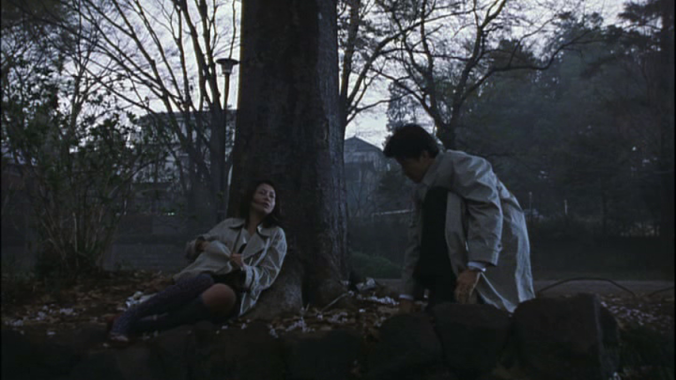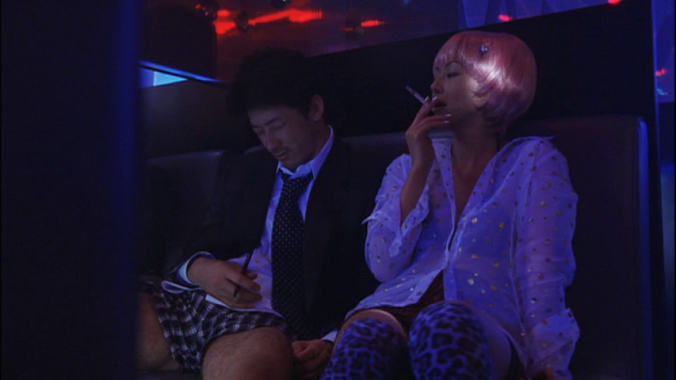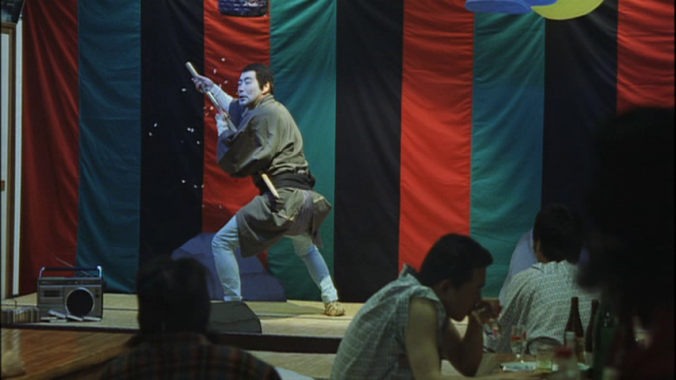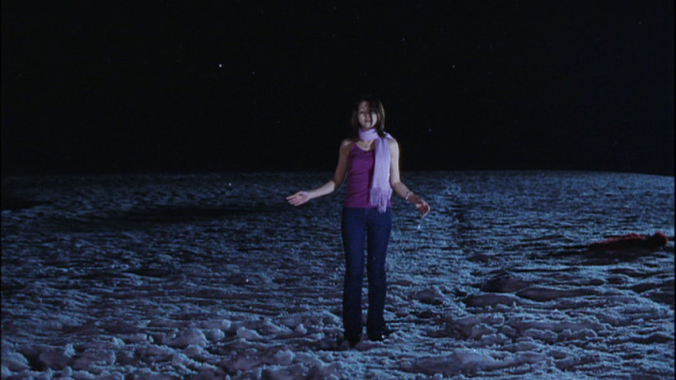 A man and a woman wake in a Tokyo park after a night of alcoholic stupor. He can’t remember how they even met. After he retrieves his pants that she has been using for a pillow, they part. After a day and a night of solitary drinking, Sawaki (Tadanobu Asano) finds himself in the airport because he has remembered he wants to see some snow, though he is not quite sure why. Yuriko (Kyoko Koizumi) also shows up there, with her own reasons for going to Hokkaido. Once in the north, they both end up in a pink rental car as he drives her to her old home on the way to the mountains where he can still find some snow. She is looking to revive her past, while he is looking to lose his. However, since it is a film by Shinji Somai, who mixes flashbacks without warning and out of sequence into the otherwise straightforward narrative, it takes us a while to learn this.
A man and a woman wake in a Tokyo park after a night of alcoholic stupor. He can’t remember how they even met. After he retrieves his pants that she has been using for a pillow, they part. After a day and a night of solitary drinking, Sawaki (Tadanobu Asano) finds himself in the airport because he has remembered he wants to see some snow, though he is not quite sure why. Yuriko (Kyoko Koizumi) also shows up there, with her own reasons for going to Hokkaido. Once in the north, they both end up in a pink rental car as he drives her to her old home on the way to the mountains where he can still find some snow. She is looking to revive her past, while he is looking to lose his. However, since it is a film by Shinji Somai, who mixes flashbacks without warning and out of sequence into the otherwise straightforward narrative, it takes us a while to learn this.
The road movie as it is known in America is fairly rare in Japan. In period films, of course, the wandering ronin or matatabi and the samurai accompanying a lord were common figures, but after trains arrived, public transportation was the primary means of long-distance travel seen in Japanese movies, and even then we only rarely found disparate travelers thrown together.
Sawaki is tense and arrogant, a man in a business suit even in his drunkenness and on a trip. He ridicules everything he finds in Hokkaido, which he sees as a backward foreign place. We will eventually learn he is an upper-level bureaucrat trying to escape a great scandal until it dies down, but the scandal itself is utterly inconceivable to Americans: while drunk, he had accidentally walked out of a shop with a couple of cans of beer without paying. Yet this makes the national scandal mags and his father in southern Kyushu forbids his appearance at his mother’s one-year memorial ceremony because of the disgrace he has brought on the family. There are hints of greater problems that have led to his being fired by phone, especially related to excessive alcohol reflected in sexual impotence, a girl-friend his boss did not approve of, and other incidents that are shown only briefly in flashback or are not detailed in any way.
Yuriko is in jeans and is emotional and often angry, so much so that the car scenes look very much like a married couple on the edge of a break-up. It will take us a while to grasp that they do not know each other at all. She had been working in a “pink club,” a bar where the hostesses do more than just laugh at the customer’s jokes.  They first met when she tried unsuccessfully to give him a blowjob and they ended up together in the park after she found him passed out on a pile of garbage sacks. But she does have a real past of her own in Hokkaido. Her husband had died in a drunken car wreck after losing all their money on a failed business and she had gone to Tokyo, leaving her baby girl with her mother until she could afford to bring the child there. Now five years later she wants to see the child she has not seen since.
They first met when she tried unsuccessfully to give him a blowjob and they ended up together in the park after she found him passed out on a pile of garbage sacks. But she does have a real past of her own in Hokkaido. Her husband had died in a drunken car wreck after losing all their money on a failed business and she had gone to Tokyo, leaving her baby girl with her mother until she could afford to bring the child there. Now five years later she wants to see the child she has not seen since.
Though it will take a while to be revealed, during that first drunken night in the park each had written a suicide note on the other’s thigh, though both had forgotten it in their stupor. Yet they end up together at an inn in the mountains. This is no spa resort, as in Hana-bi or the many other films where mountain spas are chosen for love suicides. It is full of truckers who have been stranded by the snows in the mountain pass and Yuriko is the only woman present. The owner entertains his “guests” with routines they all know, including some very vulgar songs and an imitation of Zatoichi in which he “kills” all the other men at the tables (so Zatoichi was still strong in the popular imagination a decade after Katsu’s last film).

When Sawaki leaves in disgust at the songs, another man makes a pass at Yuriko, who puts him off by saying she is “a professional.” But later the same man brings a shy friend to their room for her to teach about sex (the sex scene is not shown, nor are we told that it did not occur), after which she takes off into the snow to take sleeping pills amid falling snowflakes that glitter like fireflies, Somai’s one attempt at a beautiful scene.
One of the oddities of Japanese movies is the way performers moved between music and film. Since Momoe Yamaguchi, the teen girl “idols” had often appeared in films, but rarely as singers. Koizumi was another such “idol,” one of the most popular of the eighties and nineties, but she does not sing here either, in her first leading role in a film/TV career that would lead to much critical esteem. Asano, too, had begun in music with his own band, like Ryo Ishibashi, and had entered film with independent movies along with his singer/wife Chara, but after Gohatto he had become a significant film star. Though the scene at the inn seems designed to give one or both of them a chance to sing a song, neither does so, and even in the Tokyo scenes we see no karaoke that would suggest either had come from the pop music world.
Kaza-hana takes place mostly in Hokkaido where spring has not yet arrived  and shows us almost no flowers but the cherry blossoms seen in the opening scene in Tokyo, but somewhere along the way there seems to have been a mistranslation that confused kazahana and kasahana (updated from original copy 12/4, see comment below). This was Shinji Somai’s last movie before his early death at age 53 from lung cancer. It has fewer of the long, long takes associated with his movies made before Ah haru. However, the flashbacks still appear without warning and not in any obvious sequence. If you don’t pay careful attention to Sawaki’s suit color, you may find yourself confused as I did as to when flashback scenes occur, and I, for one, was about ninety minutes into the movie before I realized that the two had met by chance at the airport and had gone on the road together only because he thought he needed a local to take him to the snow and she had no driver’s license to rent a car of her own. For a Somai movie (or any other, for that matter), the actual ending is so unexpectedly implausible and sappy that I won’t go into it, made only more so by a jaunty tune set to the animated titles that might make you wonder if they had come from a reel of the movie showing in the adjoining theater of the cineplex. Before that, however, it is a detailed character study of a couple at the end of their ropes, not just a road movie of a mismatched pair.
and shows us almost no flowers but the cherry blossoms seen in the opening scene in Tokyo, but somewhere along the way there seems to have been a mistranslation that confused kazahana and kasahana (updated from original copy 12/4, see comment below). This was Shinji Somai’s last movie before his early death at age 53 from lung cancer. It has fewer of the long, long takes associated with his movies made before Ah haru. However, the flashbacks still appear without warning and not in any obvious sequence. If you don’t pay careful attention to Sawaki’s suit color, you may find yourself confused as I did as to when flashback scenes occur, and I, for one, was about ninety minutes into the movie before I realized that the two had met by chance at the airport and had gone on the road together only because he thought he needed a local to take him to the snow and she had no driver’s license to rent a car of her own. For a Somai movie (or any other, for that matter), the actual ending is so unexpectedly implausible and sappy that I won’t go into it, made only more so by a jaunty tune set to the animated titles that might make you wonder if they had come from a reel of the movie showing in the adjoining theater of the cineplex. Before that, however, it is a detailed character study of a couple at the end of their ropes, not just a road movie of a mismatched pair.
Kazabana or kazahana (literally, wind flower) means flurries of snow blowing in the wind. So it makes a lot more sense in the context of the film. Here’s a Wiki link for another film with the same Japanese name:
https://en.wikipedia.org/wiki/The_Snow_Flurry_(film)
Umbrella being “kasa”, maybe it was just a typo — though that’s pretty bizarre if this is the official title.
LikeLike
The subtitles on my copy and IMDB both say Umbrella Flower, but I should have looked at Alexander Jacoby , who says Snow Flurry. I assume the kanji are quite different, but I haven’t mastered them and Google translates it only as kazahana. Thanks as always for the clarification.
LikeLike
Pingback: Zatoichi (2003) | Japanonfilm
Pingback: Nana (2005) | Japanonfilm